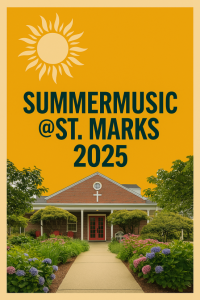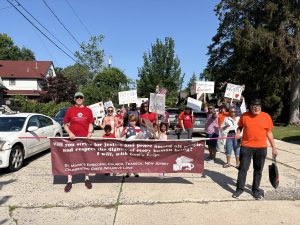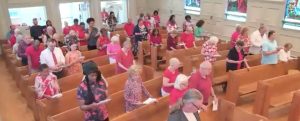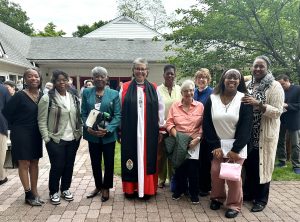Welcome!
1925 – Our 100th Year – 2025
St. Mark’s has been “Celebrating God’s Inclusive Love” since 1925. Our joyful and diverse community meets at the intersection of an ancient faith and modern thought, and we invite seekers, questioners and doubters of any religious background (or none).
Worship (In Person and Virtual)
- Sundays
- 8:00 a.m. – Holy Eucharist (Communion) simple, no music, in person only*
- 10:00 a.m. – Holy Eucharist (Communion) with music and sermon, in person and on Zoom.
- Healing Prayer is offered during Communion
- Child care for babies/toddlers available during the service*
- Church School runs concurrently with the 10:00 a.m. service during the school year*
- Tuesdays & Thursdays:
- 8:00 p.m. – Compline (Night Prayer) on Zoom
The last prayer of the “Daily Office” these are spoken services of approximately half an hour, with Scripture readings and the opportunity to offer prayers of petition (asking) and thanksgiving. There is no sermon.
- 8:00 p.m. – Compline (Night Prayer) on Zoom
NOTE: 8 a.m. service, church school and child care resume in September
Unable to join us in real time? St. Mark’s worship services are recorded so you can still participate in the prayers, hear the sermon, and enjoy the music. You’ll find the most recent one here, and we invite you to view our archive of recorded services on our YouTube channel.
Short on time? Here some sermons from our pulpit:
Events
- Sunday, July 13th – The Fifth Sunday after Pentecost
- 10:00 – Holy Eucharist with music and sermon
- 11:30 – Summer Sunday Conversation with Paul Shackford, Family Promise of Bergen County
- 10:00 – Holy Eucharist with music and sermon
- Saturday, July 19th
7:00 – Speakeasy Party presented by the Centennial Committee - Tuesday, July 22nd – The Feast of St. Mary Magdalene, First Witness to the Resurrection
6:00 – Evening Prayer
Here’s What’s Happening
 St. Mark’s Again Plans a Summer of Musical Guests - Our choir may have hung up their robes for the summer, but there will be no lack of music at worship during the warm months! St. Mark's is pleased to announce a slate of guest and featured performers to add variety and vitality to our services: July 6 Angela Rodao,… …
St. Mark’s Again Plans a Summer of Musical Guests - Our choir may have hung up their robes for the summer, but there will be no lack of music at worship during the warm months! St. Mark's is pleased to announce a slate of guest and featured performers to add variety and vitality to our services: July 6 Angela Rodao,… …St. Mark’s Again Plans a Summer of Musical Guests Read More »
 St. Mark’s marches in Teaneck Independence Day Parade - …
St. Mark’s marches in Teaneck Independence Day Parade - …St. Mark’s marches in Teaneck Independence Day Parade Read More »
 Pentecost at St. Mark’s - The Day of #Pentecost was a busy one for us! In addition to the traditional multi-lingual reading from the Book of Acts, we commissioned Marsha Mackey as our new Pastoral Care Associate and enjoyed her sermon. Meanwhile in our church school, Terry reports, "The lesson was about how diverse we… …
Pentecost at St. Mark’s - The Day of #Pentecost was a busy one for us! In addition to the traditional multi-lingual reading from the Book of Acts, we commissioned Marsha Mackey as our new Pastoral Care Associate and enjoyed her sermon. Meanwhile in our church school, Terry reports, "The lesson was about how diverse we… … Pride Kickoff and Recognizing Lifetime Achievers - A very busy Sunday at St. Mark's and beyond. We kicked off #lgbtqpride month with the flag raising after service. Today in church school we talked what it means and who it honors, which tied into our lesson on blessings. What does it mean to be blessed and what can… …
Pride Kickoff and Recognizing Lifetime Achievers - A very busy Sunday at St. Mark's and beyond. We kicked off #lgbtqpride month with the flag raising after service. Today in church school we talked what it means and who it honors, which tied into our lesson on blessings. What does it mean to be blessed and what can… …Pride Kickoff and Recognizing Lifetime Achievers Read More »
 Celebrating AAPI Representation in the Church - May is Asian-American and Pacific Islander Heritage Month, and St. Mark's observed it by raising the AAPI flag on the first Sunday of the month. Also, the slides for our online worship featured just a few of the men and women who represent the region across our wider church. "Asia"… …
Celebrating AAPI Representation in the Church - May is Asian-American and Pacific Islander Heritage Month, and St. Mark's observed it by raising the AAPI flag on the first Sunday of the month. Also, the slides for our online worship featured just a few of the men and women who represent the region across our wider church. "Asia"… …Episcopal News Service The official news service of the Episcopal Church.
- Episcopal congregation opens its doors to Texas community hit hardest by deadly floodsby David Paulsen on July 11, 2025
[Episcopal News Service] St. Peter’s Episcopal Church in Kerrville, Texas, has been open daily this week for residents seeking a place for prayer as the community deals with shock and grief after the deadly July 4 flooding of the nearby Guadalupe River. At least 120 people are reported dead from the central Texas floods, most of them in Kerr County, and more than 160 others remained missing July 11 as emergency crews and volunteers continued to comb the wreckage and debris along the river in […]
- RIP: Episcopal leaders honor Telésforo Isaac after Dominican bishop’s death at 96by David Paulsen on July 10, 2025
[Episcopal News Service] The Diocese of the Dominican Republic and Episcopal leaders churchwide are paying tribute to Bishop Telésforo Alexander Isaac, the church’s first native Dominican bishop, who died July 4 at age 96. Isaac, who had been the oldest Episcopal bishop, was consecrated bishop in 1972 and led his diocese until 1991. He later served as assisting bishop in the Diocese of Southwest Florida, from 1991 to 1996, and as an interim bishop in the Diocese of the Virgin Islands, in […]
- Historic Ohio church building with Episcopal, AA ties gets short-term demolition reprieveby Melodie Woerman on July 10, 2025
[Episcopal News Service] An Akron, Ohio, building that formerly housed the congregation of St. Paul’s Episcopal Church and has ties to the founding of Alcoholics Anonymous as well as some of the city’s noted citizens, was given a 90-day demolition reprieve, seven years after the stone structure was badly damaged in a fire. The congregation of St. Paul’s was formed in 1835, just 10 years after the city of Akron was founded. It built a church in 1847, which was replaced by a new church and […]
- Anglicans take part in WCC launch of ecumenical decade of climate justice actionby Melodie Woerman on July 9, 2025
[Anglican Communion News Service] The World Council of Churches has formally launched an “Ecumenical Decade of Climate Justice Action,” following a special plenary session during the WCC central committee meeting. The session, chaired by the Anglican Communion’s Panama Bishop Julio Murray, who also is the former archbishop of Central America, brought together church leaders, theologians and youth representatives from across six continents. The launch marks the beginning of a 10-year […]
- Wisconsin congregation preserves historic Capitol Square church as ongoing act of faithfulnessby David Paulsen on July 9, 2025
[Episcopal News Service – Madison, Wisconsin] Building maintenance at Grace Episcopal Church is an ongoing challenge. That may come as no surprise for a 170-year-old church made from porous sandstone. Repairing the sandstone is such a frequent task that the congregation keeps a reserve of limestone in its back alley that can be used as a sandstone substitute when mending Grace’s exterior walls. The congregation took on a major project in 1998 when it restored its bell tower, and since then […]
- Churches can endorse politicians, IRS says in court filingby Melodie Woerman on July 9, 2025
[Religion News Service] For years, conservative legal groups have argued that an IRS rule barring churches from endorsing candidates was unconstitutional. Now the IRS agrees. In a court filing, the IRS said the-so called Johnson Amendment, which bars all nonprofits from being involved in campaigns, should not apply to political speech during religious services. Speaking about politics at a church or other house of worship is not the same as intervening or participating in an election, […]

